- Home
- Cory Doctorow
Party Discipline Page 5
Party Discipline Read online
Page 5
I guess it pays to be a light sleeper when you’re homeless. By the time we reached the middle of the parking lot, the wheels’ whisper had woken up at least a dozen people, silhouetted and sitting up on the benches or in the grass, draped in blankets or wrapped in sleeping bags.
We stopped. They looked at us and we looked back. I felt like we were expected to give a speech or something. We come in peace? These are for you?
A person stood. She was a white lady, not much older than me. She came closer. I realized I recognized her. She’d been a senior, my freshman year. She didn’t look good. No obvious bruises or track-marks and she wasn’t that dirty, but still. She didn’t look good.
She smiled at me and nodded her head, like, Can I help you?
“Uh, hi.” I wished Shirelle would say something. I snuck her a look. She had checked out, looking glazed and tired and like someone who’d danced her ass off and scared herself to death and also was struggling with a shitty boyfriend.
“Hello.” She had a great voice. I couldn’t remember her name, but a clear picture came to me, her singing in front of the school jazz band at an assembly.
“Uh.” I gestured at the shopping carts. Between us, we’d pushed forty. What if there were a lot more people than carts? Would we trigger a riot? Would we have to decide? “Uh.” Good work, Lenae. That AP Forensics really did the trick. “We made these. They’re really good. Lightweight. Strong. Durable.” I waved my hands over them like I was on a home shopping video.
“Neat.” Her voice was lovely. Her hair was limp and stringy and there was something wrong with the way she looked at me, squinting. Hadn’t she worn glasses in high school? I wondered what had happened to them, thought about how little difference a better shopping cart would make to someone who could barely see. She squinted harder at me. “You go to Burbank High, don’t you?”
I nodded. “Yes, ma’am.” That made her smile. Pretty smile.
“Is this, like, a shop project or something?”
I shook my head. “Nothing like that.” I looked around. “It was, well, a factory in Encino was shutting down, so we had a Communist party there, made these.”
“You had a Communist party?” She really did have a pretty smile. “That’s epic. And you made these? Kids today, you’re so ingenious. Give me hope for the future.”
Shirelle giggled a little at that. Welcome back, Shirelle. “We made them for you. All of you.”
The white lady nodded. “When do you graduate?”
“This month.”
She nodded again. “What are you doing after?”
“I’m going to Glendale Community College for an associate’s in business administration, then I was going to try for financial aid at Northridge.” I’d said this so many times to so many people, it just tumbled out. “I wanna stay close to home, save money.”
She nodded. “That’s exactly what I did. Straight A’s all the way. Watch out for calculus for finance majors, it’s brutal.”
I felt like I’d been punched in the gut. I didn’t know how she ended up sleeping on a park bench, but I hadn’t thought that maybe it involved getting the same kinds of grades I was hoping to get.
“Well, uh.” I swallowed hard, because my eyes were threatening to overflow with tears. Deep breath. “I don’t know if you-all can use these, but we hoped maybe you could. They’re really good. Light. Strong.”
“They look really good.” She was being polite. She had good manners. “Thank you.”
“Can we … I mean, can we leave them with you? To give out?”
She smiled and looked understanding. Condescending even. Like Oh, honey, you have no idea. And also: but you will. “I’m sure I can figure something out.”
We walked away in silence, but once we were out of earshot, Shirelle said, “You think she’s going to try and sell them? I mean, to the other people?”
I scowled at her. I was so unaccountably pissed at her, but she was just being Shirelle. “No, dummy. She’s going to give them away to her friends.” It was dawn now, pretty and pink, and the birds were waking up and saying hello to each other at the tops of their voices.
“Shirelle, what are you doing after graduation?”
“Girl, I’m going to sleep in every morning for a month.”
“But after that.”
“You mean college?”
“Yeah.”
We turned left on Magnolia, the fancy stores with their 24 hour security guards. Some of those guys had familiar faces. A couple years before, they’d been seniors, too. They were the lucky ones. The unlucky ones were barely visible, wrapped in blankets and curled up real small behind signboards and trashcans. Some of them would have familiar faces.
“College.” She blew air out. “My mama’s been asking me about that too.”
“But you got into Glendale CC, right?”
“Yeah, I got in.” She linked her arm with mine. In the old days—a year ago, two years ago—we’d come down to Magnolia on a Saturday and shop, or window shop, with the throngs of nice people, like an outdoor mall. We loved the high-class vintage places that had survived the transition to couture brands, because it was the owners behind the counter, not shop clerks whose fear of losing their jobs made them mean, and the owners would let people like us in, let us try on clothes we could never afford. Hadn’t done that since junior year, and it wasn’t the same at 6 AM with the stores all closed. But still, it felt so good to be with my bestie on this street, arm in arm, like we were kids without a care in the world.
“I got in.” Like it was a death sentence. “But I’m not going.”
“Shirelle, why?”
That side-eye. “Come on.”
I knew. “You could get a loan.”
She snorted. “How you think that white lady in the park living out of a shopping cart? Girl, you borrow a dollar for college, you pay back ten, and you miss a payment, you pay back a hundred. I want to spend my life on the run from a loan-shark, I’ll borrow the money from an honest criminal on the corner, not some university.”
We had mandatory classes on debt-management and student borrowing, and I had to admit that this is what they added up to, when you looked at them carefully, this was pretty much what they were saying.
“But Shirelle—” I didn’t have anything else to say. When you’re right, you’re right. Shirelle was right. So what was I going to do?
“Want to get some breakfast?”
“Bea Bea’s?” They had the biggest portions in Burbank, pancakes the size of manhole covers, coffee in buckets. We used to go there for breakfast after morning swim team at the Y. Hadn’t been a year, at least.
“Hell yeah!” Shirelle linked arms with me. We didn’t talk about school or borrowing money or Communist Parties for the rest of the morning.
* * *
The shopping carts were everywhere, pushed by homeless people all around Burbank. You could spot ’em a mile away. Every time I saw one in the weeks afterward, I felt a little warm tingle. I made that. I was eighteen years old and I finally had something to show for the years I’d been walking around on the earth.
The Communist party at Steelbridge didn’t make the news, but the kids who’d been there gossiped about it and I was the coolest girl in school, the last month. A couple times I got to deny having anything to do with it when impressionable freshmen came up to me and asked if it was true I’d organized the whole thing.
I coasted along toward graduation on autopilot. My finals were all done, my acceptance letter from Glendale CC was stuck to the fridge, and with it, the letter pre-approving my student loan. Every time I looked at it, I got the opposite feeling to the one I got when I saw one of those shopping carts.
Mama paid for the gown and mortarboard rental for my graduation and Teesha made fun of me as I tried it on in the mirror.
When my phone twipped me that night at 3 AM and I answered it, Teesha mouthed I’m telling like she always did, and I rolled my eyes like I always did.
“Sh
irelle, you’re gonna get me killed. Mama isn’t joking.”
“Lenae.” Then a long silence.
“You OK?”
“That walkaway you met at the party, with the hair?”
“Yeah.” I got a light feeling in my head, a light feeling in my guts.
“You still know how to get in touch with her.” Not a question.
“Yeah.”
Teesha stared at me hard. She could tell from that one word, something was up.
“Shirelle, you’re not going to—”
“You could come too.”
Like I hadn’t thought that thought at least once a day for weeks and weeks, every time I thought about graduation, every time I looked at that letter on the fridge.
“Shirelle—”
“It’d be an adventure. The adventure. What do you have to lose?”
I looked at Teesha. She had always been my mini-me and tagalong, had turned into a truly good person while I watched, funny and sweet and trustworthy and sassy. So sassy. I thought about Mama. I thought about Shirelle and those times we’d gone shopping together or hung out or gone out for sports.
“I don’t know, Shirelle. Honestly, I don’t know.” She drew in a breath. “But I’d hate to lose it, whatever it is.”
“Oh.”
Teesha was staring at me like I might explode.
“I got that info, though. From that lady with the hair.” It felt like the words were coming out of someone else’s mouth.
“OK.”
“Don’t think I should say over the phone though. I’ll bring it to school tomorrow?”
“Put it under your doormat, I’ll get it tonight.”
“Oh.” I closed my eyes. “You can knock on the window when you get here?”
“Don’t want to wake you up, get you in trouble, maybe.”
“OK.”
“OK.”
“Bye then.”
She wasn’t at graduation. I thought of her every day that summer, working gig jobs rating search results, saving money for school. I kept the address of the walkaway lady with the hair, but I lost it somehow. Sometimes, I think I see her, dressed like a homeless, but it always turns out to be someone else. Ale tracked me down one day to ask if I knew where she was. I shrugged, and didn’t even laugh at the stupid little hat. Shirelle’s mother called my mama a bunch of times, but by the end of the summer that had stopped.
The semi-zottas threw some good parties that summer, and I got invited to some of them. None of them were as epic as my Communist party.
The first day of Glendale CC, as I milled around with thousands of other confused freshmen, I got a buzz. It was an error message, telling me that a message I’d never sent had bounced. The address wasn’t one I recognized, but I knew who it was from: ricepudding-callmemaybe. Who else could it be. I started to write it down carefully on a piece of paper, then decided to commit it to memory. I’ve never sent it a message, but I think of it every day, as I watch my grades and my student loans roll in.
About the Author
Canadian-born Cory Doctorow is the author of the New York Times bestselling young adult novel Little Brother, and the co-editor of the popular blog BoingBoing. His other YA novels include Pirate Cinema and Homeland (2013), the sequel to Little Brother. His adult novels and short stories have won him three Locus Awards and the John W. Campbell Award for Best New Writer. He has been named one of the Web’s twenty-five “influencers” by Forbes Magazine and a Young Global Leader by the World Economic Forum. He lives in London with his wife and daughter. You can sign up for email updates here.
Thank you for buying this
Tom Doherty Associates ebook.
To receive special offers, bonus content,
and info on new releases and other great reads,
sign up for our newsletters.
Or visit us online at
us.macmillan.com/newslettersignup
For email updates on the author, click here.
Contents
Title Page
Copyright Notice
Begin Reading
About the Author
Copyright
Copyright © 2017 by Cory Doctorow
Art copyright © 2017 by Goñi Montes

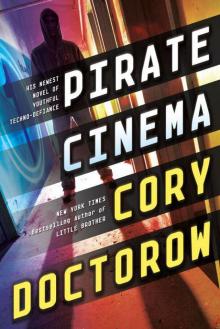 Pirate Cinema
Pirate Cinema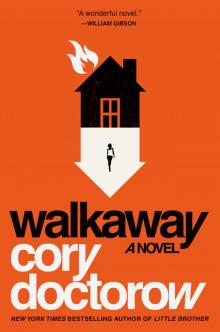 Walkaway
Walkaway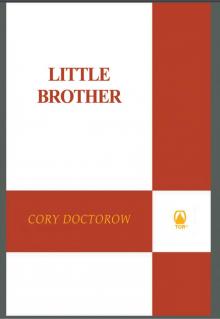 Little Brother
Little Brother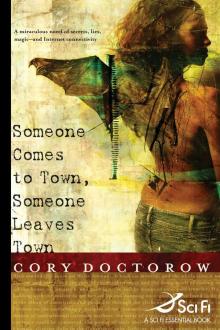 Someone Comes to Town, Someone Leaves Town
Someone Comes to Town, Someone Leaves Town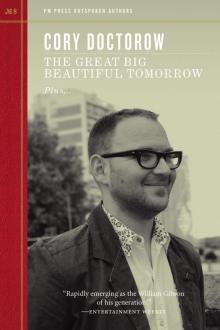 The Great Big Beautiful Tomorrow
The Great Big Beautiful Tomorrow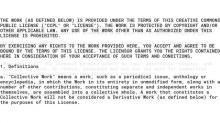 Super Man and the Bug Out
Super Man and the Bug Out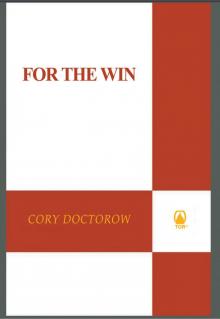 For the Win
For the Win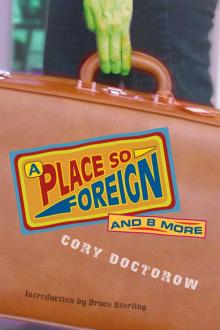 A Place so Foreign
A Place so Foreign Shadow of the Mothaship
Shadow of the Mothaship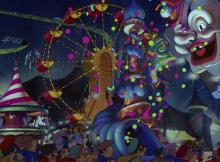 Return to Pleasure Island
Return to Pleasure Island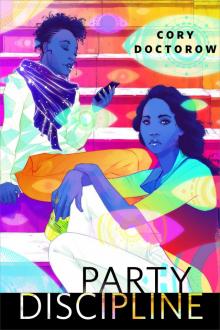 Party Discipline
Party Discipline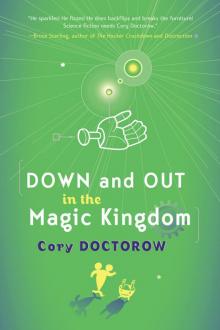 Down and Out in the Magic Kingdom
Down and Out in the Magic Kingdom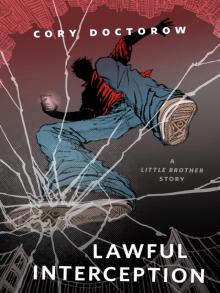 Lawful Interception
Lawful Interception Homeland
Homeland Eastern Standard Tribe
Eastern Standard Tribe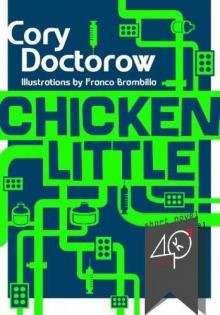 Chicken Little
Chicken Little I, Row-Boat
I, Row-Boat Makers
Makers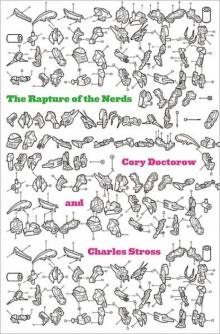 Rapture of the Nerds
Rapture of the Nerds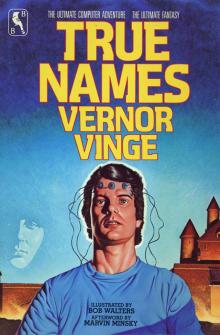 True Names
True Names